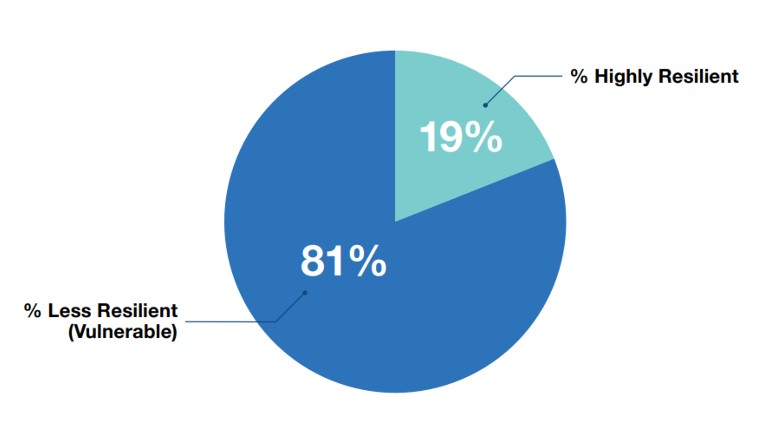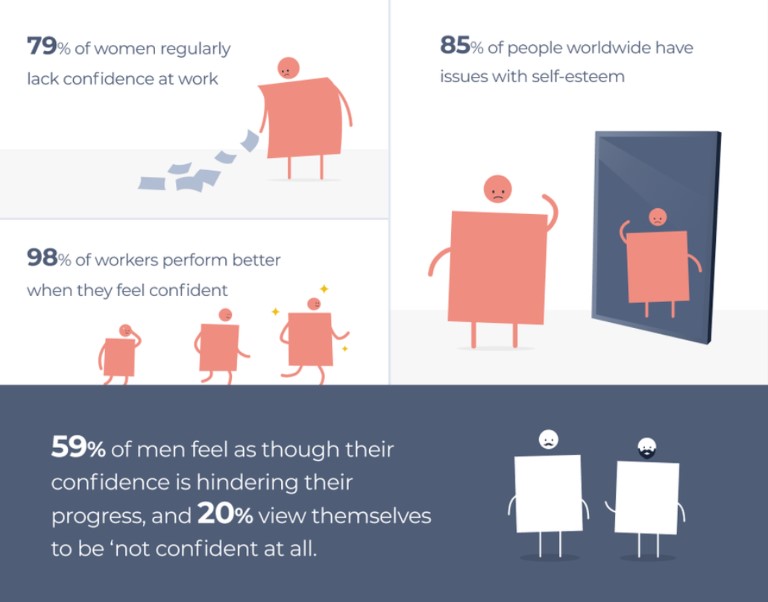Email marketing is no breeze. From tight deadlines and high expectations to creative blocks, there is serious pressure to perform. When campaigns underperform, it’s easy for your email marketing confidence to take a hit.
It can feel like a big blow, leaving even the most experienced pros questioning their abilities. It becomes important to remember that one underperforming campaign doesn’t define your skills or your worth. Instead, it is an opportunity to reflect and grow.
That’s why we’re sharing how to push past those moments of doubt, regain your email marketing confidence, and use these setbacks as fuel to bounce back better than before.
The first step? Embrace resilience
Did you know that only 19% of U.S. workers are highly resilient?

And what does resilience mean?
It involves accepting that setbacks happen. How we respond to them truly matters. So, when a campaign doesn’t hit the mark, it’s natural to feel disappointed. Think of setbacks as powerful learning opportunities. Each one gives you insight into your audience, your messaging, how email marketing is evolving, and what you can do to keep up with it.
Your next steps?
Analyzing your past campaigns, not just the ones that fell short. Also, study those that resonated with your audience. Try to identify what worked and what didn’t to understand the nuances of audience engagement better and adjust your approach accordingly.
Next on your list is getting feedback.
If your campaign didn’t achieve the desired outcome, ask why. Look into different data types, such as qualitative and quantitative, and seek input from colleagues or clients. This isn’t about critiquing yourself harshly; it’s about finding the pieces of valuable information that you might have missed because of external variables like a rush to meet deadlines.
At its core, resilience is about consistently improving rather than letting one setback define you. Committing to learning from each experience makes every campaign a stepping stone toward future success.
With just a mindset shift, i.e., seeing every outcome as a step in the right direction, you can bounce back and achieve more impactful results moving forward.
What’s more, people who love what they do are “3.2x more likely to be Fully Engaged and 3.9x more likely to be Highly Resilient than those who said they spend most of their time on work they do not love doing”, according to ADP Research’s Workplace Resilience Study.
Looking beyond simply the numbers and diving into these real-life stories of success can spark new ideas.”
Look for inspiration through success stories to build your email marketing confidence
The best way to reset your mindset and fuel creativity? Going through case studies. This is mostly because it gives you a peek into how your peers tackle similar challenges.
For instance, a business selling custom t-shirts wants to retain its audience. What do they do? Build a modest mailing list into a community of loyal fans. Instead of pushing out basic product promotions, they shift to storytelling, sharing insights about their processes, customer experiences, and the unique values behind their brand.
Alternatively, another retail brand could double down on its personalization efforts by analyzing a customer’s recent interactions and finding they’ve been viewing a certain product category. While Brand A focused on warm and relatable content, Brand B focused on emails meant to satisfy the shopping wishes of a community of fans.
As an email marketer, looking beyond simply the numbers and diving into these real-life stories of success can spark new ideas. What worked for one brand might just become your source of inspiration.

Creative storytelling can help reframe your emails. Instead of focusing solely on promotions, consider adding a narrative about your brand’s journey, customer experiences, or what makes your product or service unique. This can help you appeal to your people’s emotional side.
Using design inspiration and stunning visuals can also bring campaigns to life.
Here’s how:
- Create a clear visual hierarchy to guide readers through key messages
- Incorporate consistent brand elements such as logo design, color schemes, and typography to build trust and brand recognition
- Add dynamic elements like GIFs or interactive buttons
- Use high-quality images to improve professionalism and appeal
- Optimize for mobile to ensure visuals are mobile-friendly
With this shift in perspective, the next step is to…
Start nurturing self-confidence
Building self-confidence after a less-than-ideal attempt is easier said than done. However, taking certain steps can nudge you in that direction.
The first step is shifting from a mindset of perfection to one of continuous improvement. Rather than feeling every email has to be flawless, see each one as a way to sharpen your skills. This will help relieve the pressure and let you focus on progressing consistently rather than aiming for impossible standards.
Embracing feedback is equally important.
Seeking input from peers and superiors opens up avenues for learning that you might not see on your own. Constructive feedback can either provide fresh perspectives to inspire new strategies or confirm what’s already working well and reinforce your email marketing confidence.
Setting realistic goals is another way to nurture confidence.
While ambitious targets are great motivators, keeping goals achievable helps avoid burnout and maintains a positive outlook. When goals feel overwhelming, break them down into smaller steps. Setting up HubSpot integrations to connect your marketing platforms helps streamline this process. Each completed step, no matter how small, is progress worth celebrating. These small wins add up over time and create momentum, reminding you of your capability and resilience.

Looking at the stats above, it is obvious that self-esteem is a key aspect for employees to work on. Here are some more tips that can help you along the way:
- Don’t be hard on yourself. Instead, build on behaviors that add to your confidence.
- Intentionally train yourself to be uplifting.
- Practice patience.
- Try new things to upskill and overcome self-doubt.
- Identify your strengths and weaknesses so that you can work on them better.
- Look after your physical and mental health since they can affect performance at the workplace and outside of it.
Remember, confidence isn’t built overnight. You’ll have to take baby steps to see long-term results.
Look for support in communities
Connecting with other email marketers through forums, online communities, and networking events can give you a safe space to share experiences and challenges. It’ll help you see that even seasoned professionals face similar hurdles. Plus, it creates a sense of camaraderie with your peers.
There are a host of communities and forums to join, such as:
- Email Geeks
- Women of Email
- eMarketing Association or EMA
- r/Emailmarketing
- Smaily’s LinkedIn community
- Estonian email marketing group
Also, having a mentor or accountability partner can be beneficial.
A mentor can offer guidance based on their experiences, help you avoid common pitfalls, or provide feedback on your challenges. And, an accountability partner can keep you motivated and focused so you stay on track and celebrate progress together.
Here are some websites that offer email marketing mentorship:
- Mentor Cruise
- Growth Mentor
- Mentor Pass
- At Smaily, we also offer a free email marketing consultation, personalized to your exact wishes and goals.
Learning from others’ good and bad experiences can broaden your perspective and help you dodge potential mistakes. Each success or struggle story offers insights that can contribute to building your email marketing confidence.
In a field where success is measured by metrics, it’s easy to lose sight of the personal victories along the way. “
Celebrate even the smallest wins
Best way to build and sustain confidence? Celebrating your wins.
Regardless of how small, every step forward shows progress and is a great reminder that growth happens incrementally. These moments often go unnoticed so making it an intentional habit is crucial.
In a field where success is measured by metrics, it’s easy to lose sight of the personal victories along the way. But these small wins are the foundation that will fuel your resilience and keep you moving forward.
So, think about what you’ve gained from the process after each campaign, whether it’s a success or a learning experience.
Tried a new design approach?
Tested a different tone?
Experimented with segmentation? Great!
Even if the results weren’t as expected, each experiment will make you a better marketer. This can only happen when you actively cultivate a growth mindset.
Another confidence booster is regularly reviewing past wins. When challenges arise, looking back at successful email campaigns can remind you of your capabilities.
Past wins aren’t just numbers on a report. They prove the effectiveness of your earlier strategies, creativity, and effort. Basically, they act as your reservoir of confidence to draw from when future campaigns feel challenging or you feel blocked.
But none of these will help if you don’t recognize your personal strengths.
When you’re aware of what you excel at you have a clearer path forward and a stronger sense of self-assurance. It could be the creative ideation stage, the strategic planning, or data analysis. Regardless, work on sharpening these strengths to boost your confidence.

Move forward with renewed email marketing confidence
Every job has its ups and downs. This is especially true in a field like email marketing where results aren’t always within your control.
But by continuously learning, seeking support, and working on your weaker suits, you can overcome challenges and see steady growth. So celebrate your progress, trust your abilities, and remember that adopting a growth mindset can make you a better marketer.
Embrace the journey, and let your confidence shine through every campaign you create! And remember that if you ever need a helping hand, we at Smaily are just a message away.
About the Author

She specializes in writing for B2B SaaS (HR-tech, Sales & Mar-tech, eComm-tech, and CRM) companies looking for palatable and conversion-friendly content. You can connect with her on LinkedIn.
